The most coveted cigars will never be smoked. Here’s why
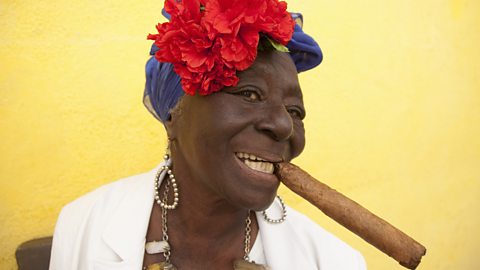 Getty Images
Getty ImagesMoney to burn?
At a time when public places for smoking are disappearing and the anti-tobacco lobby is making it uncool, hand-rolled cigars are being kept aglow by a sizeable pool of avid collectors.
United in their taste for hand-crafted Havanas, aficionados see rare, full-bodied specimens as exquisite works of art.
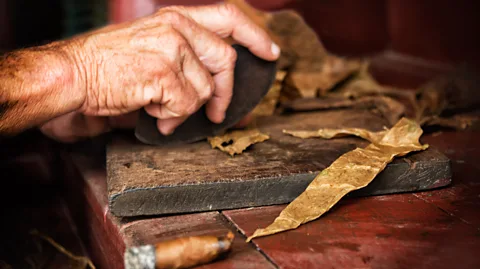 Getty Images
Getty ImagesDominique Gyselinck is a devotee.
The Belgian had her first cigar in 2001 with her husband. But in 2011, after opening her “first box of La Casa del Habano cigars,” she became an ardent collector.
Gyselinck has since been buying only the special series, handmade Cuban cigars. Today her collection features 150,000 pieces of the finest of varieties including some of the most coveted limited edition and vintage cigars.
Gyselinck, who also owns five cigar stores across Belgium, has so far invested 3m euros ($3.38m) in her personal collection of “special series, limited edition, vintage, aged and pre-embargo cigars,” she says.
Thanks to sought-after pieces such as Cohiba Behike from the original launch in 2006, worth 5,000 euros ($5,632), her collection’s value has grown to 5m euros ($5.63m), she says.
Gyselinck only buys Cuban brands which she considers “more unique” than other types of cigar and describes them as “collectible as French wines.”
The appeal
The appeal has widened according to the experts. “At one time the cigar smoking demographic was composed of, and marketed towards, the more distinguished and refined consumers,” says Rocky Patel, the owner of Florida-based Rocky Patel Premium Cigars Inc. but he says today smokers from “all walks of life” are interested.
This democratisation has opened up new frontiers. The US is no longer the biggest market. “The largest markets by far include Hong Kong, China, Singapore, Macao and Japan,” says London-based Mitchell Orchant, managing director of C.Gars Ltd, sellers of handmade Cuban cigars. “There are collectors all over the globe, though the main ones are in Europe and the Far East.”
Many of them see cigars as an alternative investment. “Judging by our annual auctions and private sales, the market is growing steadily year on year,” says Orchant, a member of the Association of Independent Cigar Specialists. “Due to the production limitations in Cuba, and the small amount of highest quality limited-edition cigars, we expect this growth to continue.”
 Getty Images
Getty ImagesAs the US moves to ease longstanding trade restrictions with Cuba, the market for Cuban cigars is expected to heat up. “When indeed the trade embargo is lifted, demand will likely increase in the short term,” says Orchant, adding that “supply may not be sufficient to cope and prices are likely to increase in the short term.”
But Cuban cigars’ forbidden fruit factor could soon wear off, warns Mumbai, India-based Danny Carroll, a cigar aficionado and founder of the Bombay Cigar Club. “Once cigar smokers realise that Cubans are decades behind in their cigar-making practices, and the end product is highly inconsistent, the sheen will rub off from Cuban cigars and they will lose ground quite quickly,” he says.
Premium cigars are also made in Nicaragua, Honduras, Dominican Republic and Peru. Orchant refers to it as “the super premium new world market,” dominated by the brands of Davidoff, Fuente and Padron.
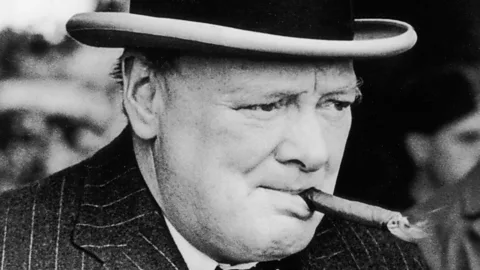 Getty Images
Getty Images“Not only is the quality of the tobacco and their presentation quite magnificent but more importantly their quality control is legendary,” he says. “Each cigar perfectly crafted and blended.”
Most coveted
The finest cigars, like rare wines, grow in value for two reasons: they become rarer as collectors consume their specimens and, if stored correctly, taste improves over time. (They can go stale. Lack of humidity can cause them to dry out and lose flavour irreversibly over time.) The limited edition cigars allowed to age under optimum conditions are considered the most desirable.
Gurkha sold five limited edition boxes of His Majesty’s Reserve cigars, which come infused with a vintage Louis XIII Cognac, in 2007 for $125,000 a box, each containing 100 cigars. “One of those boxes was auctioned in 2012 for $658,000 and entered the Guinness Book of Records for being the most expensive box of cigars ever sold,” says Carroll.
Hand rolled in factories in Honduras and Nicaragua, Gurkhas are considered the “Rolls Royce” of cigars and count celebrities like former U.S. president Bill Clinton and Hollywood stars Brad Pitt and Matthew McConaughey amongst its clients. Although non-Cuban brands from the Dominican Republic and the US have proliferated in production and popularity, it’s the Cuban variety that collectors clamour for the most.
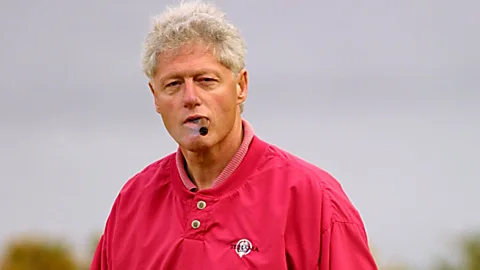 Getty Images
Getty ImagesLimited editions of Dunhill, Davidoff, Cohiba, Partagas, Montecristo, all Cuban brands, count amongst the highest performing cigars. “The first two brands have not been made in Cuba since the early 1990s, so they are by nature very rare,” says Orchant whose auction sold a pre-Embargo box of 10 of Dunhill Romeo Y Julieta at £1300 ($1,703) per cigar. “Due to the production limitations in Cuba and the small amount of highest-quality limited edition cigars, we expect this growth to continue.”
Collectors, added Orchant, also care about “the fact that they are the best of the best in terms of blending, construction and appearance.”
A touch of celebrity also has turned some cigars into universally coveted memorabilia. Former British Prime Minister Winston Churchill’s half-finished stogie, for instance, was sold at an auction in 2010 for a whopping £4,500 ($6000).
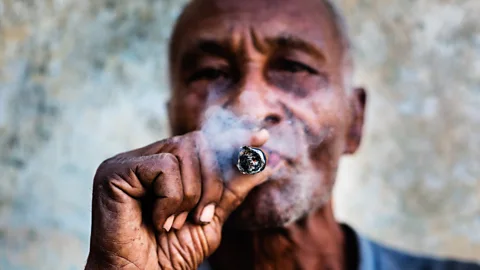 Getty Images
Getty ImagesWhere to buy
Not many are likely to stumble upon unfinished stubs left behind by famous people, but there are other ways seekers can be at the right place at the right time. Rare pieces of well-preserved vintage cigars frequently turn up at private sales and cigar auctions conducted by C.Gars Ltd and Christie's (U.K.), Havana Cigar Festival (Cuba), Guernsey's Auction and Cigar Bid (U.S.), and Cigarworld (Australia).
Frequent flyers with money to burn can pick up premium cigars at prominent brick-and-mortar purveyors such as Ligero Pipe & Cigar House (China), Swiss Cigar Bank (Switzerland), Cigars India (India), and Frank Correnti Cigars (Canada).
The more punctilious of the patrons may take matters into their own hands. Manufacturers like Gurkha take customers out to the Dominican Republic to make their own blend of cigar suited to their taste preference with personalised packaging. “A cigar collector’s most prized possession is always the cigar that he blended himself,” says Carroll. “[It’s] the ultimate luxury of the cigar collector.”
Looking after a collection
There are demanding post-purchase preservation requirements to consider. Nothing spoils a cigar quicker than heat and humidity. Cigars not stored properly become worthless rolls of leaves that neither go up in value, nor in smoke.
Cigars need to be cellared in a humidor — which can cost anything between $500 and $1,000, and up to $6,000 for intricate pieces of art — at a relative humidity of 67% to 72% and at temperature not exceeding 23 degrees Celsius, says Patel.
“These important conditions greatly affect your experience of smoking a cigar,” he says. “If the cigar is too dry it will taste very bitter and harsh, and if it’s too humid, it will burn inconsistently and lose a lot of flavour.”
Those not familiar with storage requirements should leave it to the experts. “Many cigar merchants offer clients locker facilities at a small charge,” says Orchant. “When it comes to selling, this can be an advantage as it adds to the provenance and the buyer is assured that the cigars have been stored at the correct conditions.”
Cigar lockers cost around £350 ($460) a year, including insurance, to store approximately a dozen boxes of 25 cigars, says Orchant.
When it comes to preserving expensive cigars, Gyselinck strongly advises something collectors not do: “Smoke them.”
The bottom line
This is not a game for a general financial investor as it takes specialised knowledge of buying, storing and selling cigars, says Carroll. “Unless you know what you are doing, the chances of losing money are high,” he says. “If you have a deep understanding of the space, there is definitely an investment opportunity. Failing this, stick to it as a passion and just enjoy smoking them.”
Whether set alight or set aside, cigars are a win-win proposition. “Smokers do it for their love and passion for cigars, and collectors do it for profit,” says Patel.
Played more strategically, though, it’s possible to have the best of both worlds. Many of Orchant’s clients often buy two boxes of the same cigars: one to smoke, and another to store for future sale. “In many cases, by the time they sell the second box it has, in fact, paid for both boxes, so the cigars they smoked are free,” he says.
